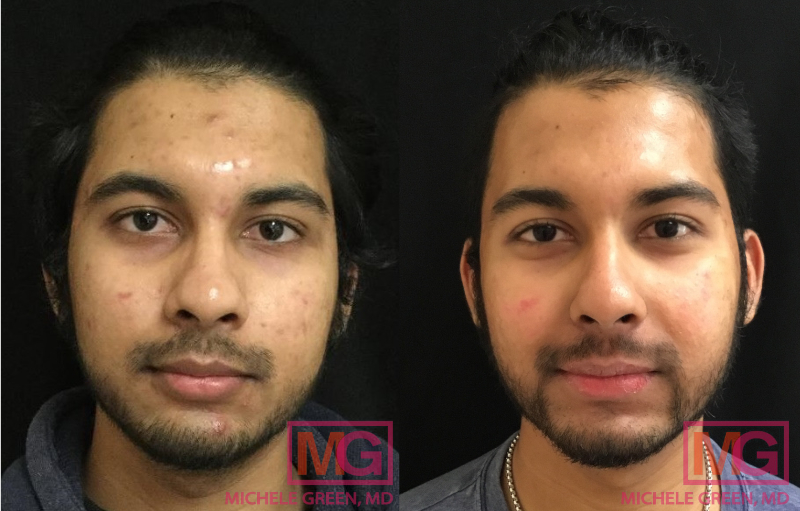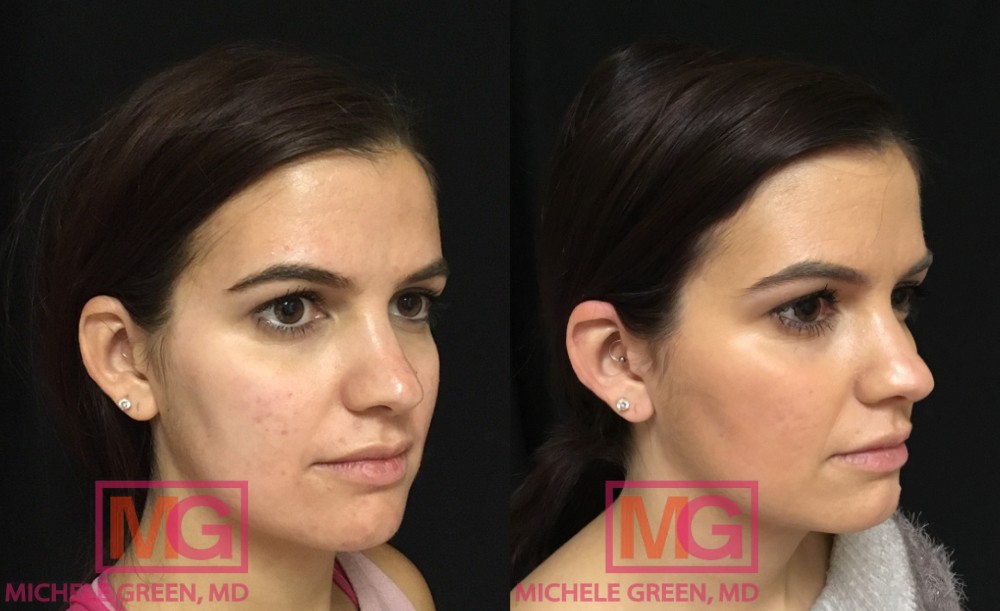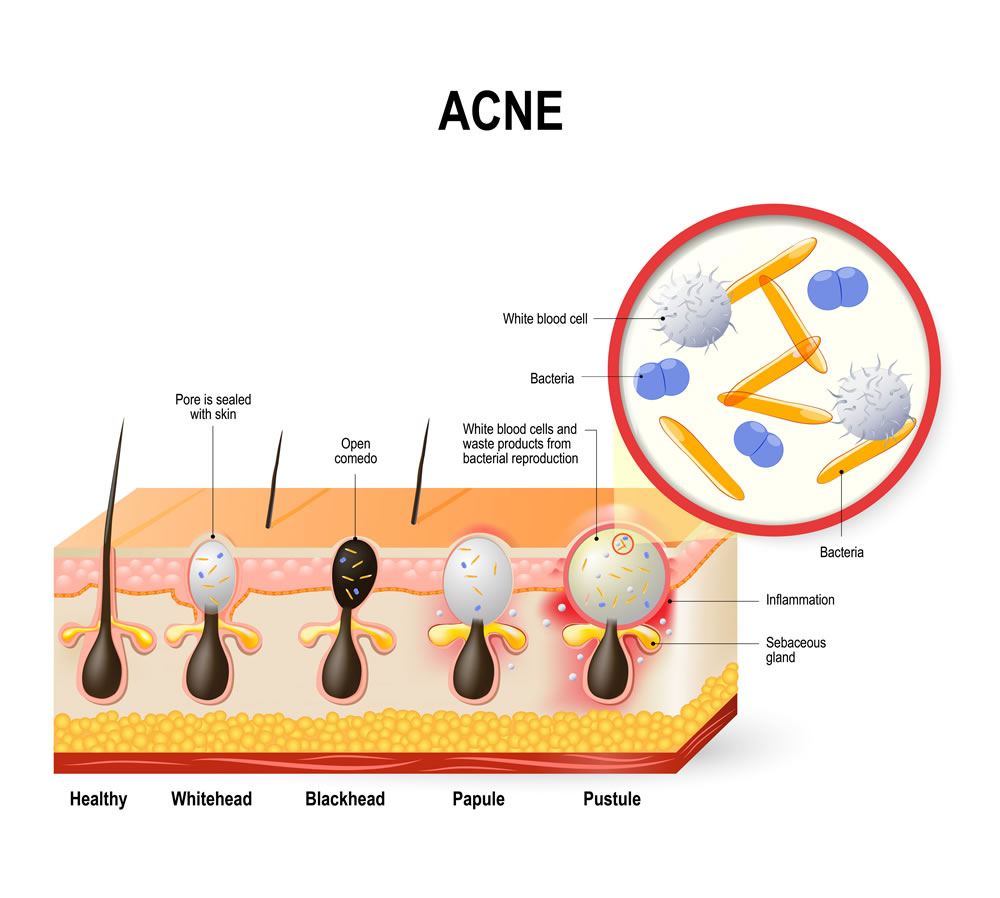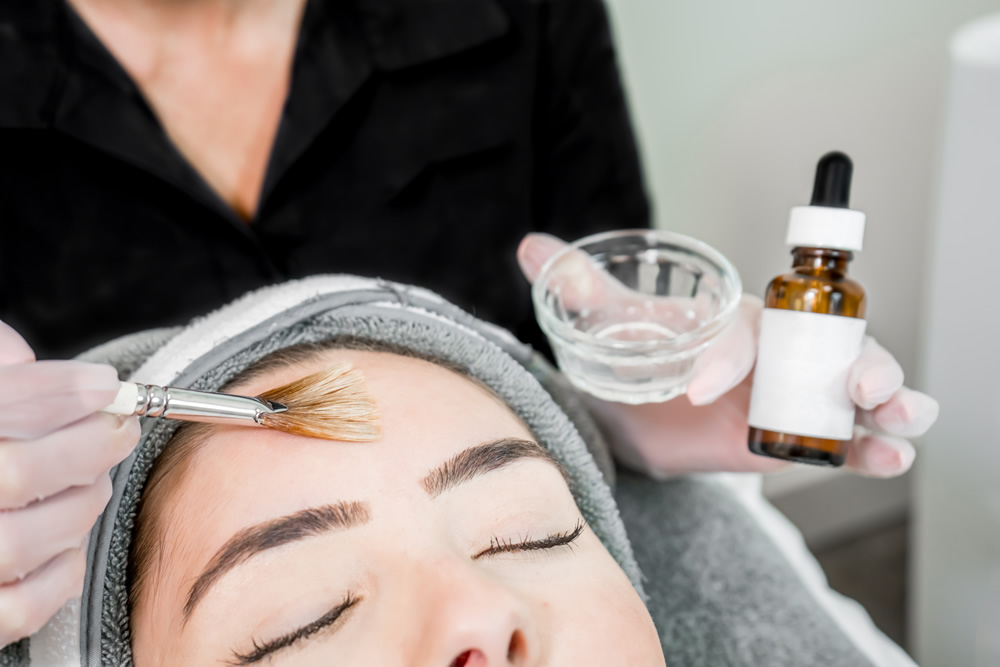Does Stress Cause Acne?
Many of us like to live our lives to the fullest and, unfortunately, our all-in commitment to work, friends, and family can lead to ample amounts of stress. One of the most frustrating experiences for our patients is how stress levels can play a role in the health of their skin, particularly when blemishes begin to appear. This psychological component of acne and wellness is often neglected when treating acne.
Adult acne is caused by a variety of factors, but stress can often play a leading role in the formation of unwanted acne flare-ups, particularly for those who already have acne-prone skin. Though we can’t always avoid stressful situations, the field of dermatology has developed a myriad of useful in-office, skincare, lasers, and spot treatments to help clear up unwanted zits.
If you’re frustrated by the appearance of adult acne, whether it’s derived from chronic stress, hormonal shifts, or an unknown trigger, board-certified dermatologist Dr. Michele Green is here to help. Dr. Green is an expert in acne, acne scar treatment, chemical peels, and cosmetic laser treatments. With over 25 years of experience in cosmetic dermatology in NYC, Dr. Green has treated thousands of cases of acne breakouts, for adult acne as well as teenage acne. If you are looking for the best skincare routine and acne treatment to prevent acne flare-ups, Dr. Green is here to help.
How do traditional acne breakouts form?
Traditional acne, known as acne vulgaris, is a highly common skin condition in which the skin’s pores are blocked with oils or debris, leading to inflammation on the surface of the skin. Typically, breakouts will occur on areas of the skin that have a large amount of sebaceous glands, or those areas that produce sebum, an oily, waxy substance that your body naturally produces near hair follicles as a part of the skin’s immune system. There are a variety of different acne lesions that can develop, the most obvious of which are inflammatory lesions described as papule, pustules, and nodules.
The cause of acne breakouts can vary widely and is usually largely determined by your body’s natural oil production, as well as your hormone and androgen levels. Additionally, bacteria can be an underlying cause of a pimple, as it can get trapped within a pore when oil and dead skin cells create a clog, leading to swelling and redness.
Can you get acne from stress?
Though stress is not the sole cause of acne breakouts, it can certainly play a role in the worsening of pimples on the skin. Chronic stress and psychological stress can both lead to added cortisol levels in the body, a stress hormone that encourages the sebaceous glands to work overtime, creating a huge increase in oil production along the surface of the skin. When mixed with dead skin cells and bacteria on the skin, this can lead to unwanted inflammation, pimples, or cysts within the skin’s pores.

6 months before and after Accutane treatment
Why does stress cause acne?
High stress levels in general can have a largely negative impact on both overall wellness and skin health. It is known to disrupt your protective skin barrier function, limit the body’s wound healing abilities, and lead to worsening skin conditions like eczema or rosacea. When it comes to acne on the skin, the body’s attempt to prepare for stress involves sending stress hormones like cortisol, which in turn triggers sebum production in oil glands that mix and mingle with dead skin cells and bacteria, leading to clogged pores. Thus, the stress itself will not lead to the appearance of a zit, but the changes in your stress levels can certainly lessen your odds of naturally clear skin.
What does stress acne look like?
Many patients have trouble telling the difference between stress-induced acne and adult hormonal acne. The main difference in these two types of acne lies primarily in location. If you seem to get acne flare-outs along the chin or jawline on a monthly basis, you are likely suffering from hormonal acne, particularly if you notice cysts developing in a repeated location on the face. As Dr. Green explains in an interview with Byrdie, these pimples, “usually appear in the same spot over and over again and become severely chronic because they’ve accumulated so much oil over a span of days or even weeks.”
Stress acne, on the other hand, tends to appear on areas of the face that have the most active oil glands. Typically, stress-related zits will develop along the T-zone of the face, which extends from the forehead down along the nose to the chin. In the case of a true stress acne flare-up, patients tend to note a lot of widened pores, redness, and oily sheen, as well as increased blackheads and whiteheads within this area.
Can stress cause cystic acne?
Stress acne tends to look more akin to zits that develop during adolescence, appearing on the more naturally oily areas of the face (forehead, nose, chin). It typically appears as a combination of blackheads, whiteheads, red bumps, and pustules, and rarely appears as a single pimple. Due to stress’s affect on the body, most people experience stress acne breakouts rather than a single blemish. The excess oil production related to stress breakouts can increase the likelihood of developing cystic acne, though the majority of patients experience blemishes nearer to the surface of the skin.
Cystic acne tend to develop when a pore is clogged with bacteria and dead skin cells under the surface of the skin. This then leads to an increase of bacteria that is trapped within the layers of the skin, which then leads to a large, swollen area. Cysts can quickly increase in size and number, and the infections are rooted deep within the dermis. Due to the painful nature of cystic acne, as well as its high risk of scarring, it’s best to consult Dr. Green to treat the infection. In most cases, patients will cystic acne will use oral medications like Doxycycline or Accutane.

1 month before and after Accutane
Where does stress acne show up on the body?
Stress acne can develop anywhere that has a high amount of sebaceous glands or oil production on the body. Though most patients experience stress acne in the T-zone of the face, stress acne breakouts can develop elsewhere on the body, particularly among patients who have a history of acne breakouts on the back, chest, neck, buttocks, or other areas.
Can Stress Cause Back Acne (Bacne)?
Due to the increase of stress hormones like cortisol that stimulate increased sebum and oil production, stress can certain stimulate an increase in back acne. For patients who struggle with back or body acne, stress – in combination with other habits, such as wearing tight synthetic fabrics, staying in sweaty clothing after exercise, or using irritating skincare products – can certainly lead to a breakout of unwanted back acne. If you’re struggling with body acne breakouts due to increased stress levels, Dr. Green can use her expertise in treating acne all over the body to determine a treatment plan that’s right for you.
Other causes of adult acne
Though stress can often exacerbate the presence of adult acne, there are other common causes that can trigger an acne flare-up. Hormonal acne is a common experience for adult women, and tends to occur around the chin or jawline on a monthly basis. Additionally, changes in daily skincare routine, lifestyle, hygiene, and diet can all contribute to the development of pimples and blemishes. If you’re frustrated by continued adult acne, a simple curated treatment plan from Dr. Green that considers both your current skin health and medical history can make a world of difference.
Can hormonal shifts cause acne?
Hormonal shifts absolutely can cause acne and are a leading cause of acne among adult women. Learn more about how to treat hormonal acne.
Can COVID-19 cause acne?
The novel coronavirus has led to a surprising array of varied symptoms in patients who contract the virus. Among these symptoms are unique skin issues, including the development of rashes that lead to tender or itchy bumps. Some patients have developed comedonal or cystic acne after having had COVID-19. It is thought that the stress of the disease, coupled with fever and sweats, can cause acne breakouts as the immune system is weakened from the viral disease.
Moreover, the majority of patients who are dealing with acne during the Covid-19 pandemic are developing acne and zits due to the everyday integration of personal protective equipment (PPE). The most common form of PPE is that of a face mask, which unfortunately has led to the infamous “maskne” trends. Wearing a face mask for daily activities can irritate the skin, as well as create a humid environment that can clog pores and foster increased bacteria growth. For this reason, Dr. Green recommends sticking to breathable fabrics for face mask use, such as cotton and silk, as well as regular face–and face mask–washing after the use of PPE.
COVID-19 and cystic acne
In some cases, the repeated use of face mask and PPE along without proper cleansing and hygiene can increase the likelihood of developing cystic acne. Learn more about how to treat and prevent maskne.

Pimple Prevention: How to Control Stress Acne
One of the best ways to control stress acne is through the use of gentle cleansers, topical treatments, and in-office acne treatments that can improve the overall health of your skin. Additionally, a vital way to prevent stress breakouts is to lessen the stress in your life! Self-care such as increasing sleep, improving diet and exercise, and limiting the stressors in your life can all help to curb acne flare-ups triggered by stress. Here are some Dr. Green-recommended acne treatments:
Cleansers and Nourishing Skincare Products
When it comes to reducing the appearance of acne, it’s important to make sure that you are using nourishing products that won’t increase the likelihood of an acne flare-up. Gentle cleansers with helpful active ingredients like salicylic acid can help to exfoliate the skin, reducing the amount of debris and dead skin cells on the surface of the skin, and encouraging cell turnover. Additionally, lightweight, oil-free moisturizers with restorative ingredients like hyaluronic acid can help to make sure that your skin is hydrated while keeping your pores clear.
Topical Spot-Treatments
There are a variety of topical acne treatments that are offered as over-the-counter or prescription treatments with active ingredients proven to heal acne lesions. When considering topical treatments, it’s best to look for active ingredients like salicylic acid, benzoyl peroxide, and retinol in order to exfoliate the skin, reduce bacteria on the skin, and increase cellular turnover, respectively. Additionally, topical antibiotics are able to tackle acne caused by bacterial infection. Common spot-treatment gels include Differin (a retinoid-like drug made of adapalene), Epiduo Forte (a combination of adapalene and benzoyl peroxide), and Dapsone gel (a topical antibiotic). Dr. Green’s MGSKINLABS also offers a unique 3-step acne treatment that relies on acne-fighting ingredients such as glycolic acid, salicylic acid, and benzoyl peroxide to eliminate acne breakouts.
Oral Medications
Oral antibiotics can often be used to treat acne caused by bacteria o the surface of the skin. Additionally, oral contraceptives (birth control pills) can help to shift your body’s hormone balance, thus decreasing acne breakouts by regulating your natural hormonal cycle. Another option to treat hormonal acne is spironolactone, which is a good option for patients who have a preexisting hormonal imbalance. Spironolactone works by decrease androgen levels in the body, a common cause of acne. Lastly, Isotretinoin, commonly referred to as Accutane, is an effective oral medication for those with severe acne, recalcitrant acne, or cystic acne. Typically, isotretinoin is recommended for patients who have tried multiple acne treatment options and haven’t found an effective solution.
In-Office Treatments
There are many in-office treatments that can help to improve and heal acne lesions. For example, acne surgery or extractions are an excellent way to extract blackheads and remove trapped oils and dead skin cells. Another common option is an intralesional cortisone injection, which can treat inflammation both with traditional pimples and acne cysts.
Laser Acne Treatments
Laser treatments are a proven way to treat acne, redness, acne scars, and other skin texture issues. One of the most popular is that of the V-Beam laster which helps to treat the redness and the resulting inflammation from acne. Blue and Red Light therapies are an excellent option for eliminating acne-causing bacteria, as well as reducing oil gland size. Lastly, photodynamic therapy relies on blue light to eliminate bacteria and treat acne at its source. When acne is left untreated, the result can be unwanted acne scars. Dr. Green is an expert in treating acne scars with facial peels, Fraxel laser, eMatrix, Vivace, Microneedling, Subcision, and TCA cross.

Chemical Peels
Chemical peels relying on key ingredients such as glycolic acid or trichloroacetic acids are a wonderful option for those looking to reduce the appearance of acne while also rejuvenating the skin. Chemical peels work to exfoliate the top layers of the skin, removing dead skin cells and exposing the younger layers of the dermis underneath.
Hydrafacials
The Hydrafacial is a medical-grade facial that is structured in three parts: cleansing, exfoliating, and infusing the skin with restorative serums. This facial not only revitalizes and hydrates skin, but also vacuums out sebum, dead skin cells, and bacteria from pores, which then allows the supportive serums to be better absorbed. The Hydrafacial is commonly used to treat redness, “dull” skin, and other signs of aging, in addition to treating acne.
If you’re frustrated by the appearance of acne due to stress, there are solutions that can help. Contact our New York-based office today to develop your custom acne treatment plan with Dr. Green. With over two decades of treating acne and acne scars in her discreet NYC office, Dr. Michele Green will utilize the most cutting edge treatments to improve the tone, texture, and radiance of your skin. To find out more about your options for acne treatments, contact us online today or call 212-535-3088
 212-535-3088
212-535-3088